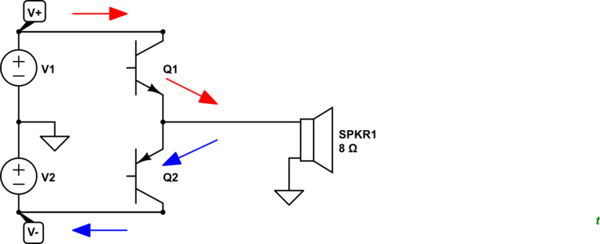- Is a power amplifier able to generate power?
- Does a power amplifier draw power from a supply?
- Does a power amplifier dissipate power itself?
- If a power amplifier draws power from a supply, does it dissipate all of the indicated power drawn?
3 Answers

simulate this circuit – Schematic created using CircuitLab
Figure 1. The output stage of a power amplifier and the loudspeaker.
Is a power amplifier able to generate power?
No. The amplifier uses a power supply.1
Does a power amplifier draw power from a supply?
Yes, V1 and V2 in Figure 1.
- If Q1 is turned on current will flow from V1 through Q1 and into the speaker. This will push the speaker cone in one direction.
- If Q1 is turned off and Q2 is turned on current will flow from the speaker through Q2 and into V2.
Does a power amplifier dissipate power itself?
Yes. The transistors behave a little like variable resistors. When the resistance decreases more current flows to the speaker. This current and the voltage across the transistor produces heat which has to be dissipated - usually on a heatsink at the back of the amplifier.2
If a power amplifier draws power from a supply, does it dissipate all of the indicated power drawn?
No. Power in = Power out + heat. Depending on the amplifier circuitry it could dissipate about half the power as heat and half to the speaker (which will also dissipate most of the power as heat).3
1 This explanation uses a dual rail power supply for simplicity. Other arrangements are possible and common.
2 To be more specific, \$ P_{Q} = V_{Q}I_{Q} \$ where \$ V_{Q} \$ is the voltage across the transistor.
3 Higher efficiency amplifiers such as Class-D minimise power loss by switching at high frequency between V+ and V-. In this method a transistor is either fully off so \$ I = 0 \$ and \$ P_Q = 0 \$ or the transistor is fully on, the voltage across it is low and the resultant power dissipated in the transistor is low.
Is a power amplifier able to generate power?
No
Does a power amplifier draw power from a supply?
Yes
Does a power amplifier dissipate power itself?
Yes
If a power amplifier draws power from a supply, does it dissipate all of the indicated power drawn?
Only if it's supplying no power to a load. If it supplies a load, then it dissipates the difference between what it draws from the supply, and what it supplies to the load.
- No, power comes from supply.
- Yes, amplifier uses power from supply.
- Yes, amplifier does consume power, there is no device that is 100% efficient.
- No, an amplifier would usually take only the power it needs to provide some power at output.
